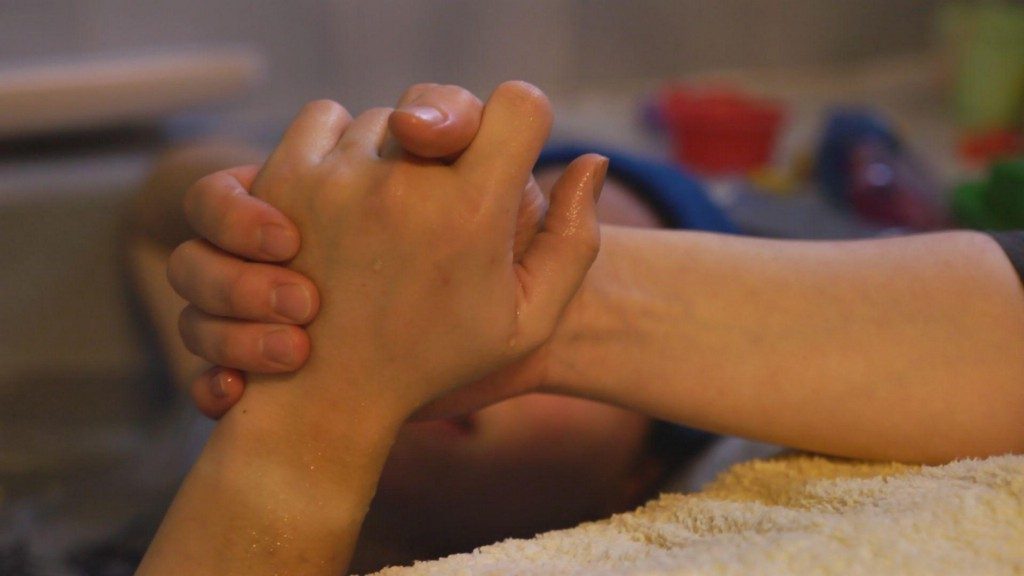Juliet Jordan is a British documentary filmmaker, currently based in New York City. She graduated from The National Film and Television School, Beaconsfield, Britain. She won the Royal Anthropological Institute’s Student Film Award for her production “Uncle John.”
After graduating, she worked freelance in London for the BBC and various independent companies, then worked in education whilst raising her children. Her other credits include “Milly and Simon” and “Listen to Kilburn.” (Press materials)
“Miriam: Home Delivery” will premiere at the 2015 DOC NYC Film Festival on November 15.
W&H: Please give us your description of the film playing.
JJ: “Miriam: Home Delivery” is a feature-length documentary about one of the world’s oldest professions. Miriam is a home-birth midwife. In America today, caesarians and hospital births are considered the norm, but outside that mainstream, there is a community who, by exercising their choice, are perceived as the risk-takers.
We follow Miriam and a group of determined mothers as they battle the unpredictable forces of nature, from bacteria to the worst super-storm in New York City history, to fulfill the miracle of birth.
W&H: What drew you to this story?
JJ: I met my first midwives when I gave birth to my daughter, and I was fascinated by the primal nature of their job. They took this event — so new and astonishing to me — in stride. Their practical and supportive role was so clearly part of a fundamental, timeless profession.
I am British, and in my country having a home birth was just one of the many available options when choosing the way I wanted to deliver my child. Not unusual, and not perceived as dangerous — just a very common option.
When I moved to the U.S., I was amazed at what an enormous step in an “alternative” direction women were having to take to exercise choice in the delivery of their children. In the U.S., home-birth midwives are often seen as the risk-takers, operating outside the cultural norm. I was drawn to follow the work of one of these women who enables birth, [which should be] perceived as something other than a medical event by the women she works with.
W&H: What was the biggest challenge in making the film?
JJ: Keeping up with Miriam’s schedule of endless, sleepless nights and being permanently on call — and Superstorm Sandy’s arrival!
W&H: What do you want people to think about when they are leaving the theater?
JJ: I would like people to think about the journey they have taken with the people in the film — into lives they wouldn’t otherwise have seen — [and] that they [feel as if they ] haven’t been shouted at, or bombarded with facts — that they have spent time with people and been given the space to think about what they experienced.
W&H: What advice do you have for other female directors?
JJ: Find a good mentor whose advice you respect, and don’t be afraid to ask for advice. Be confident that the way you tell a story may not conform to a mainstream pattern, but if it works, it’s valid. Trust your instincts. Don’t watch other people’s work while you are finding the shape of your own film!
W&H: What’s the biggest misconception about you and your work?
JJ: That it is a charming hobby, not a career.
W&H: How did you get your film funded? Share some insights into how you got the film made.
JJ: The film was self-funded, and so, because of financial constraints, it took two years to complete. I made the money to complete “Miriam” by shooting behind-the-scenes footage for a video-game company.
My cinematographer training and my production background meant that the production costs were low, as I shoot myself and record sound.
Being just me with my small camera achieves an intimacy with the people whose life I am becoming part of. Filmmaking, however, needs to be collaborative work. It is so important to get fresh eyes on a project, and the amazing skill of an editor is vital to a film.
The financially toughest part of the process was affording post-production.
W&H: Name your favorite woman-directed film and why.
JJ: Joan Churchill’s 1981 documentary “Soldier Girls.” I trained in an Observational/Direct Cinema tradition, and Joan’s camera work and her presence on “Soldier Girls” were inspirational to me. Watching the film, it was easy to see and hear her co-director Nick Broomfield, but the camera work and the complexity she reveals were inspirational for me to watch. I wanted to know who was on camera.
Kim Longinotto [is also one of my favorite women directors], of course!







